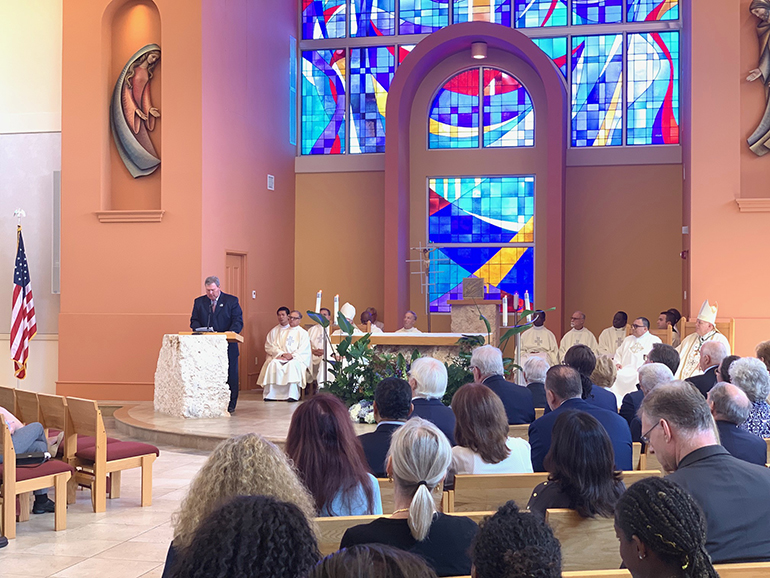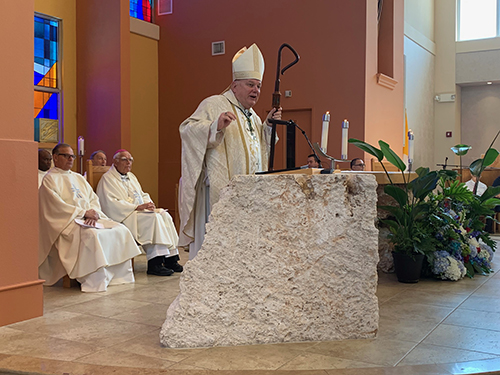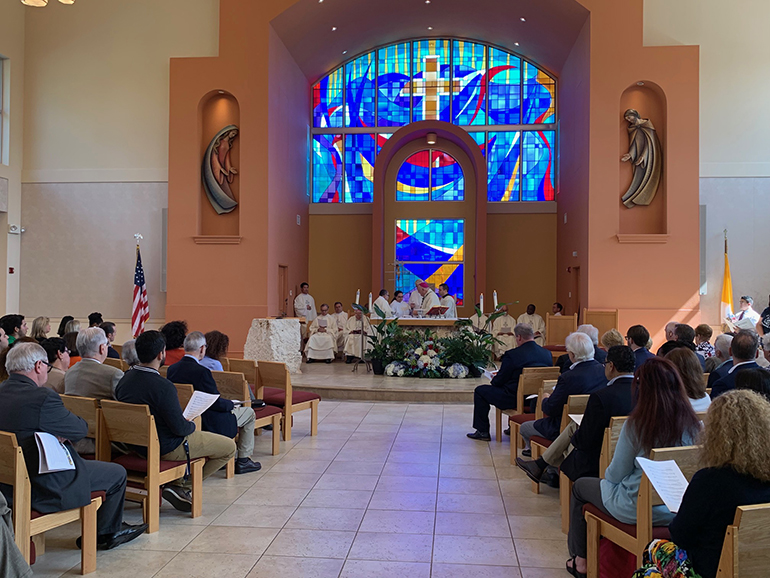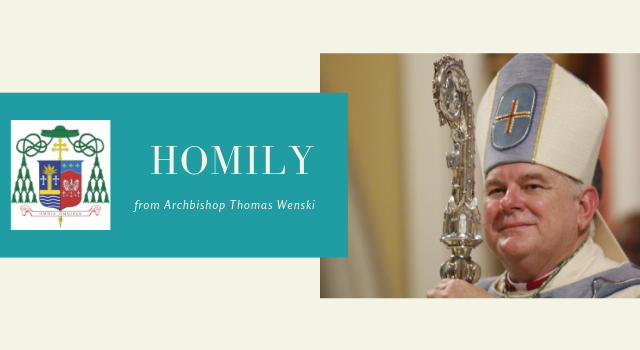By Archbishop Thomas Wenski - The Archdiocese of Miami

Photographer: COURTESY
St. Thomas University President David Armstrong says a few words after Archbishop Thomas Wenski celebrated a Mass to mark the 15th anniversary of the dedication of St. Anthony Chapel on the university's Miami Gardens campus.
Archbishop Thomas Wenski preached this homily during the noon Mass Feb. 4, 2019, at St. Thomas University’s St. Anthony Chapel, in Miami Gardens.
Today we celebrate the 15th anniversary of the dedication of the chapel – and we are honored with the presence of two donors who made it all possible, Joe and Winnie Amaturo. This chapel, designed by a former priest faculty member, Father Jorge Sardinas, could be described as a prayer made in brick and mortar. Prayer is the lifting up of our minds and hearts to God and this chapel does really help us to pray – not only by providing the St. Thomas University family a fitting worship space but its simple beauty situated in the heart of our campus does help to direct our minds and our hearts to God.
As the Pope emeritus, Benedict XVI, said: A world without God is a world without hope, it is a world without a future. And prayer is not the last recourse of the desperate – although one might get that impression around exam time; rather, it is the prime resource of the hopeful, for only those who have hope pray.

Photographer: COURTESY
Archbishop Thomas Wenski preaches the homily during the Mass marking the 15th anniversary of the dedication of St. Anthony Chapel on the campus of St. Thomas University in Miami Gardens. Behind him, far left, is Msgr. Franklyn Casale, past president of St. Thomas U. At right is Bishop Luis del Castillo, emeritus of Melo, Uruguay.
This archdiocesan sponsored university as a Catholic institution is anchored in hope, for the educational project is about giving those who study here a future of hope – in this life and in the life to come.
The wisdom that comes from revealed faith and the wisdom that comes from human learning are not necessarily incompatible – as is sometimes thought in this post-modern age in which we live. Often, we find those who feel that they must deny reason for the sake of their faith – faith for these people at best is reduced to empty sentimentality; at worst, a facile justification for murderous ideologies.
And just as often, we can find those – especially among the denizens of the ivied halls of academia – who feel that they must deny faith for the sake of reason. Reason for these people is reduced to vain pedantry and conceited sophistry. But again, to quote Pope Benedict, a man who was known for his scholarship long before he became pope: “Anyone who excludes God from his horizons falsifies the notion of reality and…can only end up in blind alleys or with recipes for destruction.”
Today, besides acknowledging Joe and Winnie for this gift – among many – they have given this university, we also will memorialize the Augustinian Fathers who established this school as Biscayne College at the invitation of my predecessor, Archbishop Coleman Carroll. They came from Cuba when the regime there closed Santo Tomas de Villanueva in Habana in 1961. The closing of that institution certainly was an attempt to exclude God from Cuba’s horizons – and the truth of Pope Benedict’s words – “a world without God is a world without hope” – is illustrated in the sad and tragic history of Cuba after the so called “triumph of the revolution.”
If once the world was threatened by the ideological materialism represented by Marxist-Leninism, today it is threatened by the practical materialism increasingly dominant in the secularized West. If the ideological materialism of Marxism denied that God exists, the practical materialism asserts that God doesn’t much matter. But both ideologies can only lead us up blind alleys – for both, by seeking to close the human heart and mind to the possibility of transcendence – which is ultimately the calling, or vocation, of every human person – they close the human heart and mind to a future, a future of hope.
Such falsified notions of reality are at the heart of the crisis of modern humanism which has lost faith not only in God but in human reason itself. It is expressed in the moral relativism that already made great inroads in our popular culture – a relativism that holds that truth can be what we say it is and not what it is in itself. Today, our society tells us that women must always be believed – and that itself should be considered a true advance – but because of the ideology of gender, people are having a hard time knowing who is and who is not a woman.
To oppose faith and reason is to create a false dichotomy – as Pope St. John Paul II wrote: “Reason and faith cannot be separated without diminishing the capacity of men and women to know themselves, the world and God in an appropriate way.”
As Catholics, we believe that truth is one. In that sense, there can be no real contradiction between belief and science, between faith and reason. The so-called “contradictions” that some would allege are only apparent ones that can be resolved through honest and reasonable inquiry.
As Catholics we believe in both the value and power of faith and the value and power of reason. Pope John Paul II said: “Faith and reason are like two wings on which the human spirit rises to the contemplation of truth; and God has placed in the human heart a desire to know the truth – in a word, to know himself – so that, by knowing and loving God, men and women may also come to the fullness of truth about themselves.”
This “coming to the fullness of truth about God and ourselves” is really a great description of what an academic pursuit that aspires to call itself “higher education” should be about.
In a time when people are tempted to think “that it’s all about me,” an education in the Catholic tradition reminds us that the path to self-realization and true happiness is not found through self-seeking but through self-giving. The purpose of an education is not for us to “get more” but to help us “be more.”
To know the fullness of truth about God and ourselves was what led the Augustinian Fathers to found Santo Tomas de Villanueva in Havana some 70 years ago. “Transplanted” here to Miami at the invitation of my predecessor, Archbishop Coleman Carroll, the work of those fathers was not lost but found “good soil” here in South Florida to continue to flourish.
The Church, as she has through her history, wishes that her faith, through reasoned dialogue, will shape the culture in which she lives – so that the culture may become more worthy of man. This is why throughout her history the Church has promoted the speculative and practical sciences involved in the educational project.
This chapel should remind all who pass through this campus that God matters – and because God matters, there is a future of hope. So, let us lift up our minds and hearts to God in prayer.

Photographer: COURTESY
View of St. Anthony Chapel as Archbishop Thomas Wenski celebrates Mass to mark the 15th anniversary of its dedication, on the campus of St. Thomas University in Miami Gardens.

